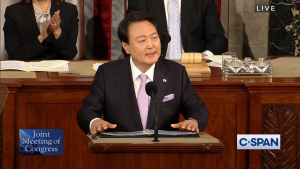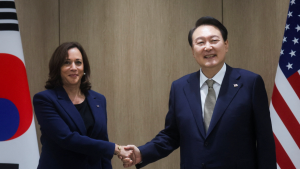Half favor using US forces to defend South Korea if invaded by North Korea, down from 55 percent in 2022.
As the United States and South Korea mark the 70th anniversary of their alliance, they celebrate a relationship that now encompasses a broad range of issues. The 2023 Chicago Council Survey—conducted September 7–18, 2023—finds Americans see South Korea as more influential than at any time in the past and view the relationship with Seoul as strengthening US security.
Key Findings
- American perceptions of South Korea’s influence in world affairs is at an all-time high. On a zero-10 scale, where zero is not influential at all and 10 is highly influential, South Korea receives a mean score of 5.1, up from 4.5 in 2021.
- Seven in 10 (71%) say the relationship with South Korea does more to strengthen US national security and two-thirds (64%) support having long-term military bases in South Korea.
- A slim majority (52%) say North Korea’s nuclear program is a critical threat facing the United States, unchanged from 2022.
- Eight in 10 (79%) say the United States should focus on other pressing problems facing the United States besides North Korea and just 28 percent support taking military action to force North Korea to give up its nuclear weapons.
- Half of Americans (50%) favor using US forces to defend South Korea if invaded by North Korea, down from 55 percent in 2022.
- Sixty-six percent of Americans think US leaders should be ready to meet and talk to North Korean leaders.
- Three-quarters of Americans (75%) say the United States should cooperate with North Korea on the return of remains of US soldiers killed during the Korean War. A bare majority (51%) support sending congressional delegations to North Korea.
South Korea’s Perceived Influence Hits Record High among Americans
Over the past five years, South Korea’s cultural influence has risen dramatically as its movies, music, and television series penetrate the American market. At the same time, the American public’s perceptions of South Korea’s global influence have also shifted.
When Americans are asked to rate South Korea’s influence on world affairs on a zero to 10 scale, where zero means not at all influential and 10 means they are extremely influential, South Korea receives a mean score of 5.1. This is the first time South Korea has exceeded 5.0 since the question was first asked in 2010 and is up from 4.5 when the question was last asked in 2021.
But it is worth noting that South Korea is also perceived as the least influential of any country included in the survey. The United States (8.4) is viewed as the most influential. China received a 7.5 mean score and Japan 6.0. Other countries included are Russia (6.3), the United Kingdom (5.9), Germany (5.7), Saudi Arabia (5.7), and Israel (5.4).
Americans also tend to take favorable views of South Korean leaders. Nearly six in 10 (58%) of Americans view hold favorable views of President Yoon Seok-yeol, including 57 percent of Republicans and 63 percent of Democrats. This is similar to the favorable ratings in 2021 for then-president Moon Jae-in (64%). Yoon’s 2023 favorability was slightly lower than favorable views of Japan’s Kishida Fumio (63%), but far ahead of China’s Xi Jinping (8%).
Relationship with South Korea Does More to Strengthen US National Security
The security relationship between the United States and South Korea—formed in the aftermath of the Korean War—remains one that is highly supported by the American public. And it is not seen as a one-sided commitment by the United States. Seven in 10 Americans (71%) say the security relationship between the two countries does more to strengthen US national security than it does to weaken it (25%). That trails only perceptions of US relations with Germany (77%) and Japan (77%) when it comes to strengthening US national security.
Accordingly, nearly two-thirds (64%) of Americans favor maintaining long-term military bases in South Korea. That number has remain largely unchanged since the question was first asked in 2002 when it was 67 percent.
However, support for defending South Korea has steadily declined since 2017, when 62 percent said they would favor using US troops to defend South Korea if North Korea invaded. In 2023, that number is 50 percent. Much of that decline is driven by a drop among Republicans, which went from 70 percent in 2017 to 46 percent in 2023. Democrats, meanwhile, went from 59 percent in 2017 to 57 percent in 2023.
This decline has two likely driving factors. The first is that threat perceptions of North Korea have declined in that same time. In 2017, 75 percent cited North Korea’s nuclear program as a critical threat. In 2023, that number was just 52 percent. The second factor is likely Republican leadership that has continued to call into question the value of US alliances around the world.
Moving forward, security remains at the core of the US-South Korea alliance for the American public. Nearly eight in 10 (79%) say preventing North Korea from building its nuclear capability remains a priority. But that is no longer perceived to be the only role for the relationship with South Korea. Seven in 10 (73%) think limiting the rise of China’s power should also be a priority, as should be encouraging South Korea to spend more on its own defense (73%). However, there is little appetite for trying to bring about regime change in North Korea. Just 47 percent say that should be a priority for America’s relations with South Korea.
Americans Want to Focus on Challenges Other Than North Korea
Even as North Korea ramps up its missile testing, including multiple launches of missiles capable of hitting the US mainland, threat perceptions of North Korea among the American public remain near all-time lows. In 2023, 52 percent of Americans say North Korea’s nuclear program is a critical threat facing the United States. That is unchanged from 2022 and is 23 percentage points lower than the peak in 2017 when it was 75 percent.
In light of the reassessment of the threat presented by North Korea, much of the American public appears ready to move on. Nearly eight in 10 (79%) say the United States should focus on other pressing problems facing the United States besides North Korea. That sentiment is equally shared by Democrats (81%), Republicans (80%), and Independents (79%) and is largely unchanged from 2022 (77%).
There also remains little appetite for confrontation. Just 28 percent favor taking military action to force North Korea to give up its nuclear weapons. That is the lowest number since the question was first asked in 2021 when it was 35 percent.
Instead, the American public is open to diplomacy. Two-thirds (66%) of Americans think US government leaders should be ready to meet and talk with the leaders of North Korea. This top-down diplomacy was the hallmark of the Trump administration, and the public remains supportive of that type of engagement. However, there is less support (51%) for sending congressional delegations to visit North Korea.
In terms of substantive cooperation, there is broad support for working with North Korea in one specific area. Three-quarters (75%) of Americans say the United States should cooperate with North Korea on the return of remains on US soldiers killed during the Korean War.
Conclusion
The American public continues to see value in the relationship with South Korea. Not only is it perceived to do more to strengthen US national security, but its cultural prevalence has likely increased its perceived influence on world affairs. And when it comes to North Korea, Americans may be experiencing something of Pyongyang fatigue. While they are not ready to shut the door, the security emphasis on Ukraine means there are other challengers that are perceived as being more important to the United States.
This analysis is based on data from the 2023 Chicago Council Survey of the American public on foreign policy, a project of the Lester Crown Center on US Foreign Policy. The 2023 Chicago Council Survey was conducted September 7-18, 2023 by Ipsos using its large-scale nationwide online research panel, KnowledgePanel, in both English and Spanish among a weighted national sample of 3,242 adults aged 18 or older living in all 50 US states and the District of Columbia. The margin of sampling error for the full sample is ±2.0 percentage points. The margin of error is higher for partisan subgroups or for partial-sample items.
Partisan identification is based on how respondents answered a standard partisan self-identification question: “Generally speaking, do you think of yourself as a Republican, a Democrat, an Independent, or what?”
The 2023 Chicago Council Survey is made possible by the generous support of the Crown family, the Korea Foundation, and the United States-Japan Foundation.


Related Content
 Public Opinion
Public Opinion
But partisan divisions over using US troops to defend allies in Europe and Asia are growing.
 US Foreign Policy
US Foreign Policy
The hope in Seoul and Tokyo is that even if Donald Trump is reelected, their partnership with Washington will be strong and resilient enough to survive.
 US Foreign Policy
US Foreign Policy
"According to the Chicago Council on Global Affairs, America's positive view of Korea are reaching the highest levels since 1978," President Yoon Suk-yeol told Congress.
 Public Opinion
Public Opinion
A majority support using US troops to defend Seoul should North Korea invade, Council polling shows.


